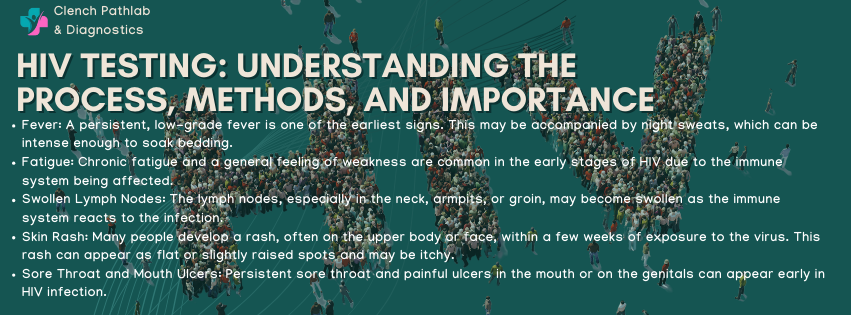Introduction to HIV Testing
HIV testing is a crucial step for diagnosing and managing Human Immunodeficiency Virus (HIV) infection. Getting tested not only aids in early detection but also ensures timely treatment and helps reduce transmission. This guide covers the various methods of HIV testing, the accuracy of these tests, and how to interpret the results.
Why HIV Testing Is Important
Early Diagnosis: Early testing enables prompt treatment, improving the quality of life for individuals with HIV.
Prevention of Spread: Knowing one’s HIV status reduces the risk of spreading the virus.
Improved Health Outcomes: Early detection helps maintain a stronger immune system through timely medication and care.
The HIV Testing Process
Preparing for the Test
Before undergoing an HIV test, you may be asked about your medical history, lifestyle, and potential risk factors. This preparation helps in choosing the most appropriate test.
Types of HIV Tests
- Antibody Tests: These tests detect HIV antibodies in blood or oral fluid, usually around 3-12 weeks post-exposure.
- Antigen/Antibody Tests: This test detects both HIV antigens and antibodies, providing earlier detection (2-4 weeks post-exposure).
- Nucleic Acid Tests (NAT): Detects HIV in the blood and is often used for early detection (within 10-33 days of exposure). NAT is usually reserved for high-risk cases due to its cost.
How to Get Tested for HIV
Testing Locations
Healthcare Facilities: Clinics, hospitals, and health centers offer confidential HIV testing.
At-Home Test Kits: Home testing allows for privacy and can be a convenient option. Approved kits are available, providing results within minutes.
HIV Testing Methods
Rapid Tests: Often conducted in clinics or at home, rapid tests provide results within 20-30 minutes.
Lab-Based Tests: Typically more accurate, lab tests involve drawing blood to detect HIV antibodies or antigens, with results available within a few days.
HIV Test Results Interpretation
Understanding the Results
Negative Result: Indicates no HIV was detected, though follow-up testing may be recommended, especially if taken shortly after potential exposure.
Positive Result: A preliminary positive result will need confirmation by additional testing before a final diagnosis.
- Dealing with a Positive Result
Receiving a positive result can be overwhelming, but counseling is often available to help individuals navigate treatment options and next steps.
HIV Testing Accuracy
Factors Affecting Accuracy
Window Period: The time between exposure to HIV and when it can be detected. Testing during the window period may yield inaccurate results.
Test Sensitivity and Specificity: Different tests have varying sensitivity levels, impacting their ability to detect HIV accurately.
Common Myths about HIV Testing Accuracy
Myth: Rapid tests are less accurate than lab tests.
Fact: Rapid tests are highly accurate but may require confirmation if the result is positive.
Conclusion
Regular HIV testing is essential for early detection, effective treatment, and reducing transmission risks. By understanding the types of tests, accuracy, and results interpretation, individuals can make informed decisions about their health and well-being.
Read More Blogs: Genetic Testing
Frequently Asked Question
How long should it take for me to get tested for HIV?
Most people develop detectable antibodies within 3-12 weeks post-exposure. Consult a healthcare provider for the best timing based on individual risk.
Are at-home HIV tests accurate?
Yes, FDA-approved home tests are highly accurate, though positive results should be confirmed by a healthcare provider.
What does a reactive or positive HIV test mean?
A reactive test indicates HIV antibodies were detected, but additional testing is required to confirm the diagnosis.
Can I rely on a negative result if I’ve tested early?
It’s best to retest after the window period if exposure was recent to ensure accuracy.
Does HIV testing require fasting or other preparations?
Generally, no fasting is needed, but follow any specific guidelines provided by your healthcare provider.
